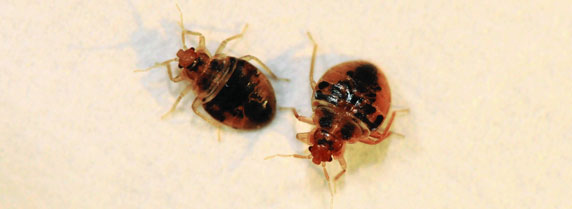Why Are Bed Bugs So Hard to Control?
By Chris Williams on January 14, 2015.

If you’ve researched the control of bed bugs at all, I’m sure you’ve heard that it is not a job for the faint-hearted. Those who know say you shouldn’t try to do your own bed bug control, that bed bugs are not a DIY job (see So You Think You Want to Control Bed Bugs on Your Own). Let me say that crashing a bed bug population is relatively easy, but eliminating an infestation is hard. Bed bug control almost always requires multiple service visits and a combination of methods. These are only a few reasons why:
Bed bugs are hidden, secretive, and small
It really takes someone with special knowledge (like a pest control technician) to find bed bugs in hiding. Bed bugs are flat and good at hiding in cracks, crevices, and other protected sites. Bed bugs may be below visible detection levels in your home, yet they are still there. Newly-hatched nymphs, by the way, are small enough to squeeze through a stitch hole in a mattress or in upholstered furniture.
Bed bug eggs are nearly invisible and especially difficult to find, remove, or kill
No matter how many bed bugs professionals kill with insecticides, steam, or cold, the protected eggs will soon begin hatching, and will continue to do so over a period of days or weeks. You only have to miss a few tiny eggs to have the population rebound on you. Follow-up treatments are necessary to kill bed bugs that have hatched since the previous visit.
Many bed bug insecticides provide poor control
It seems that bed bugs rebounded in the U.S. already resistant to entire groups of pesticides. If bed bugs are not sprayed directly, these missed bed bugs and newly hatched nymphs are often unaffected by the insecticide residues left behind. The insecticides available to the general public are the least effective.
Bed bugs are not out and about every day
Bed bugs can remain well hidden and dormant for weeks between feedings. In the absence of a host, they can go for many months without a blood meal. Especially in heavy infestations, only a small percentage of the bed bug population will come in contact with insecticide residues within the first few days after application when the residues might still prove effective.
Photo credit: Medill DC / Foter / CC BY
Stay up-to-date with Colonial Pest’s email newsletter!